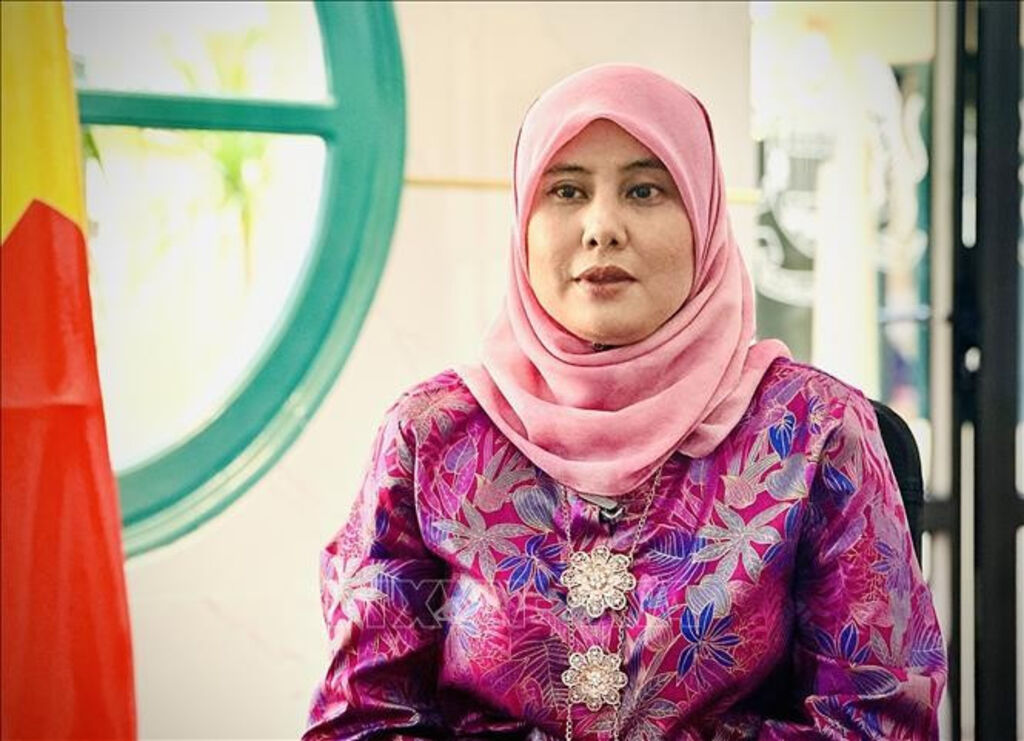 |
| Malaysian Deputy Ambassador to Vietnam Cik Aida Safura Niza Othman__Photo: VNA |
Prime Minister Pham Minh Chinh's trip to Malaysia for the 47th ASEAN Summit and related meetings in Kuala Lumpur carries great importance for both ASEAN and relations between Vietnam and Malaysia, stated Malaysian Deputy Ambassador to Vietnam Cik Aida Safura Niza Othman.
Speaking to the Vietnam News Agency ahead of the visit, the diplomat said that at the regional level, it demonstrates Vietnam’s strong support for Malaysia’s priorities during its ASEAN Chairmanship.
The visit is expected to further enhance practical cooperation in key areas such as the ASEAN Power Grid and digital connectivity, contributing to regional stability through diplomacy and collaboration.
Bilateral ties will also benefit, as this is an opportunity to reinforce commitments under the Comprehensive Strategic Partnership between the two nations. Both sides are working closely to deliver concrete outcomes in priority fields such as clean energy, power grid connectivity, trade and investment, and the development of a trusted digital economy that enables micro, small and medium-sized enterprises (MSMEs) to join regional value chains.
The two countries are also advancing cooperation in the Halal industry, science and technology, green growth, maritime security, and defense connectivity, while expanding people-to-people exchanges through education, tourism and skilled labor mobility. These efforts will make the partnership stronger and more resilient, she said.
The Deputy Ambassador said that this year's summit will be one of ASEAN’s largest gatherings in decades. Kuala Lumpur will host numerous world leaders, including those from the US, China, Brazil, South Africa, and Japan, the European Council President. Around 12,000 delegates and some 2,800 journalists have registered to attend. Nearly 80 documents are expected to be adopted during the meetings, the diplomat stated.
A historic milestone will be the admission of Timor-Leste as ASEAN’s 11th member, alongside mechanisms ensuring that Dili can participate meaningfully from the outset.
Economically, leaders are set to upgrade the ASEAN Trade in Goods Agreement (ATIGA), update the ASEAN–China Free Trade Area (ACFTA 3.0), and establish a framework agreement on the ASEAN Digital Economy.
On sustainability, the newly adopted ASEAN Energy Plan targets 45 percent of installed power capacity from renewable sources by 2030, complementing the ASEAN Power Grid to ensure clean, stable, and affordable electricity. Malaysia will also launch an MSME Centre and the ASEAN AHEAD innovation initiative to help small businesses adopt green strategies and digital skills.
She noted that procedural steps for Timor-Leste’s full membership is now on track to be formalized on October 26. She added that Malaysia has been working closely with other member states to facilitate this process.
Regarding Vietnam–Malaysia relations, Deputy Ambassador Cik Aida Safura Niza Othman highlighted that its future is very promising.
Both countries are entering a new phase of their Comprehensive Strategic Partnership, with complementary strengths aligned with ASEAN’s priorities. Vietnam’s manufacturing capacity, digital dynamism, and export momentum combine well with Malaysia’s expertise in finance and energy systems. In the energy sector, Malaysia sees cooperation with Vietnam as a catalyst for the ASEAN Power Grid and for developing a credible renewable energy certification scheme.
Moreover, she suggested, both sides should enhance integration in key areas such as secure cross-border data flows, interoperable payment systems, cybersecurity, and harmonized standards to reduce costs for MSMEs. Stability will remain essential, and Malaysia will continue working with Vietnam to uphold regional peace and security while building resilience through greener supply chains, food security cooperation, disaster response, and skills development, said the diplomat.
To sustain this momentum, the two countries should promote public–private partnerships under their Comprehensive Strategic Partnership, particularly in sectors such as semiconductors, advanced manufacturing, agri-trade, Halal standards, tourism, and education. If effectively implemented, Vietnam–Malaysia cooperation will not only advance both economies but also reinforce ASEAN’s credibility as a more integrated, equitable, and transformative community built on consistent and sustainable collaboration, the Deputy Ambassador concluded.- (VNA/VLLF)









